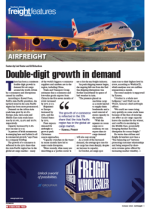Aircraft manufacturers have been improving f lying efficiency and safety for some time through the introduction of digital f ly-by-wire controls.The systems have become so reliable that French manufacturers Airbus and Dassault have started lobbying regulators to allow passenger planes to operate with one pilot in the cockpit for most of a long-haul f light.While fully autonomous aircraft are a way off, the airfreight industry is fast automating its own systems to go hands-free.Artificial Intelligence, blockchain and the Internet of Things are enhancing supply chain visibility, optimising operations, and improving security. “Air cargo makes it happen — but digitalisation takes it to the next level,” says the International Air Transport Association (Iata). “Only by unleashing the full value that digitalisation presents, can the industry streamline operations, boost efficiency, and stay ahead of other transport modes. “Digitalisation is the solution to positioning air cargo for success, making it faster, smarter, and more competitive in the future,” according to the association.To support the transition, Iata has introduced ONE Record, an end-to-end digital logistics and transport supply chain where data is easily and transparently exchanged in a digital ecosystem of air cargo stakeholders, communities and data platforms.The long-term goal of digitalisation is to enhance the end-to-end shipment process, involving various participants such as carriers, forwarders, ground handlers and shippers, the organisation explains.Stuart Hayman, head of carrier integration and transformation at WiseTech Global, says the rising demand for airfreight makes digitisation a top priority. “Customers now expect transparency of data across the entire supply chain, meaning airlines cannot rely on disjointed manual processes,” he writes.The industry is heading in the right direction, he believes.“As it stands, the air cargo industry has made significant moves towards digital integration in recent years. “Iata’s e-freight initiative marked a significant shift towards digitalisation by establishing an end-to-end paperless transportation process for air cargo through a regulatory framework, electronic messages, and high-quality data. “The next step is Iata’s ONE Record, which goes beyond traditional EDI and messaging technologies. “ONE Record is a standard for data sharing that creates a single record view of the shipment. “It will place higher emphasis on shipment records (air waybills) and tracking, moving towards a more open data standard.“For airlines and forwarders, this means introducing new processes for sharing operationally critical data across the industry and developing the technical capabilities needed to support this shift,” he writes. ER

